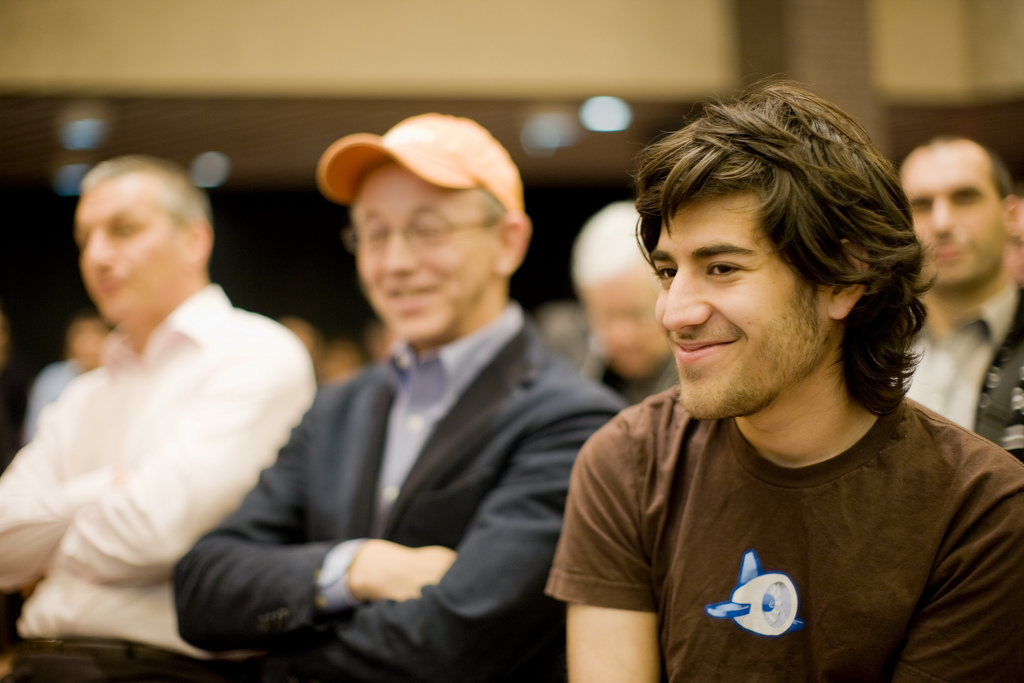
Aaron Swartz at a Creative Commons event in 2008.
Well-known computer programmer and co-founder of Reddit Aaron Swartz committed suicide last month. After his alleged download of copyrighted academic articles from subscription provider Journal Storage, or JSTOR, the Justice Department prosecuted Swartz with the threat of up to 50 years in prison. Faced with an enormous punishment because of alleged copyright violations, Swartz’s internet activism—in both life and death—strikes a chord among tech-savvy Aragon students.
Today’s youth, armed with free information as a result of the internet, often sees illegal downloads as a non-issue. “I don’t think piracy is wrong at all,” says freshman Alton Olson. “It’s a natural thing right now, and it’s not something you can stop very easily. Companies like to view every pirate as someone who is taking away their profit, but that’s not true.” Swartz’s ambitions, in fact, were centered around his goals for free information for the world. According to the Los Angeles Times, Swartz believed the information in JSTOR’s academic articles belonged to everyone.
After Swartz conducted the raid on JSTOR at MIT, the university blocked a plea bargain that could have allowed Swartz to receive no jail time. Following the suicide, however, Gregg Housh set up a blog surveying MIT professors on their opinion on the case. According to Housh, one anonymous professor said, “All academic work should be open to all,” while another was quoted, “I am sympathetic to his goals, but disgusted by his methods.”
“Swartz was helping people learn,” says sophomore Gilliana Lau. “People who don’t have money to buy textbooks can get it for free that way. It’s like he is creating his own library.”
Illegal downloads, however, are not always of a scholarly nature. The Department of Justice’s shutdown of Megaupload in early 2012 reminds internet users of the heavy-handed punishments that can arise from copyright violations. Megaupload hosted all kinds of files, ranging from video games to music. The site generated millions of dollars in profit while simultaneously harming the revenue of copyright holders, according to the Federal Bureau of Investigation. If extradited to the United States, Megaupload’s founders face a maximum penalty of 20 years in prison.
The issue of peer-to-peer sharing often smears the blame in some copyright cases. Both Napster and the Pirate Bay operated on the platform of users distributing information from computer to computer instead of utilizing a centralized server, which creates challenges for prosecutors. Junior Richard Shu says, “There’s a difference between piracy and peer-to-peer sharing. Piracy is intellectual theft, like what happened with Megaupload. Peer-to-peer is where everything is made free [by users].” By current copyright laws, users of the site as well as site owners can be held responsible for copyright infringement, since the website merely acts as a platform for distribution. Even though both sites attempted to distance themselves from punishments using the peer-to-peer argument, both came face to face with legal repercussions.
Opinions differ among the Aragon student body about whether or not Swartz truly committed any wrongdoings. “What he did is wrong since he broke into the system’s computer at MIT,” says sophomore Jeremiah Rondeau. “I suppose both parties were in the wrong. The prosecutors were wrong morally, but Swartz was wrong morally and legally. Documents were made available to specific students, and should not have been published [by Swartz].”
Lau agrees. “[Swartz’s actions] were wrong, but at the same time I support him because piracy is convenient and it’s free,” she says.
Although internet users know, to an extent, that heavy punishments exist for piracy and the illegal distribution of content, to some the consequences remain unclear. Says Lau, “It really isn’t clear. Tons of people pirate things and share them, but I don’t think people realize you can get sent to prison.”
Some believe that Swartz’s notoriety as an activist and a programmer would assist the prosecution for publicity goals. “The prosecutors are trying to make a name for themselves,” says Rondeau. “It’s a publicity case, and people know that, but now everyone knows that they bullied him too far.”
In light of recent events, the Justice Department has been heavily criticized for its actions. Some believe that the suicide could have been prevented with less aggression from the prosecutors. Others, however, think that the situation should be left alone. “I don’t think piracy is the biggest problem in the world,” says Lau. “There are other things we should be worrying about, especially if pursuing this leads to a suicide.”




